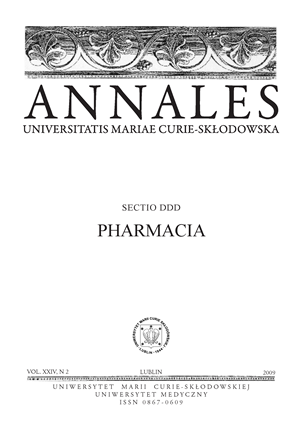Kardiomiopatia w przebiegu cukrzycy, patogeneza, diagnostyka, leczenie
DOI:
https://doi.org/10.2478/v10080-008-0192-9Abstrakt
Cukrzyca jest jednym z głównych problemów dotyczących zdrowia współczesnego społeczeństwa. Jest przyczyną wielu groźnych powikłań, wśród których powikłania kardiologiczne zajmują czołowe miejsce, gdyż mogą prowadzić do szybkiego zgonu pacjenta. Istotnym i jednocześnie podstępnie rozwijającym się powikłaniem cukrzycy jest kardiomiopatia. Jest ona wynikiem skojarzonego działania niekorzystnych czynników, takich jak: endoteliopatia, dysfunkcja układu autonomicznego, zaburzenia przemiany węglowodanów, i co za tym idzie choroby niedokrwiennej serca oraz nadciśnienia tętniczego. Problem kardiomiopatii cukrzycowej wymaga okresowego monitorowania układu krążenia i szybkiego wdrożenia leczenia farmakologicznego przy pierwszych jej objawach. Coraz częściej prezentowane są również opinie sugerujące zapobiegawcze stosowanie leków kardiologicznych w grupie pacjentów bezobjawowych. Do zaleceń Europejskiego Towarzystwa Kardiologicznego zalicza się dwie grupy leków: inhibitory konwertazy angiotensyny oraz beta-adrenolityki. Leczenie kardiomiopatii u pacjentów z cukrzycą powinno również obejmować normalizację masy ciała i precyzyjne wyrównanie metaboliczne.
Bibliografia
1. Avogaro A., Vigilide Kreutzenberg S., Negut C. et al.: Diabetic cardiomyopathy: a metabolic perspective. Am J Cardiol. 93 (8A): 13A–16A, April 2004. doi:10.1016/j.amjcard.2003.11.003. PMID 15094099.
2. Effects of ramipril on cardiovascular and microvascular outcomes in people with diabetes mellitus: results of the HOPE study and MICRO-HOPE substudy. Heart Outcomes Prevention Study Evaluation Study Investigators. Lancet, 355, 253, 2000.
3. Hunt S. A., Baker D. W., Chin M. H. et al.: American College of Cardiology/ American Heart Association. ACC/AHA Guidelines for the evaluation and Management of Heart Failure in Adult: Executive Summary. A Report of American College of Cardiology/American Heart Association Task Force on Practice Guidelines (Committee to Revise the 1995 Guidelines for the evaluation and Management of Heart Failure). J. Am. Coll Cardiol., 38, 2101, 2001.
4. Kannel W. B., Mc Gee D. L.: Diabetes and cardiovascular disease. The Framingham study. JAMA 241, (19): 2035–8, May 1979. doi:10.1001/jama.241.19.2035. PMID 430798.
5. Moir S., Hanekom L., Fang Z. Y. et al.: Relationship between myocardial perfusion and dysfunction in diabetic cardiomyopathy: a study of quantitative contrast echocardiography and strain rate imaging. Heart, 92, October 2006.
6. Niebisz A. B., Karnafel W.: Przewlekła niewydolność serca w cukrzycy, Kardiologia na co Dzień, 2 (1), 31, 2007.
7. Ryden L., Stand l E., Bartnik M. et al.: Guidelines on diabetes, pre-diabetes, and cardiovascular diseases. The Task Force on Diabetes and Cardiovascular Diseases of the European Society of Cardiology (ESC) and of the European Association for the Study of Diabetes (EASD). Eur. Heart J. 28, 88, 2007.
8. Shekel l e P. G., Rich M. W., Morton S. C. et al.: Efficacy of angiotensin-converting enzyme inhibitor and beta-blockers in the management of left ventricular systolic dysfunction according to race, gender, and diabetic status. A meta-analysis of major clinical trials. J. Am. Coll Cardiol., 41, 1529, 2003.
9. Shindler D. M., Kostis J. B., Yusuf S. et al.: Diabetes mellitus, a predictor of morbidity and mortality in the Studies of Left Ventricular Dysfunction (SOLVED) Trials and Registry. Am. J. Cardiol., 77, 1017, 1996.
10. Tatoń J., Czech A., Bernas M.: Diabetologia kliniczna, PZWL, 54, Warszawa 2008.
11. Zuanetti G., Latini R., Maggioni A. P. et al.: Effect of ACE inhibitor lisinopril on mortality in diabetic patients with acute myocardial infarction. Circulation, 96, 4239, 1997.
Pobrania
Opublikowane
Numer
Dział
Licencja
Prawa autorskie (c) 2009 Autorzy

Praca jest udostępniana na licencji Creative Commons Attribution-NonCommercial-NoDerivatives 3.0 Unported License.


